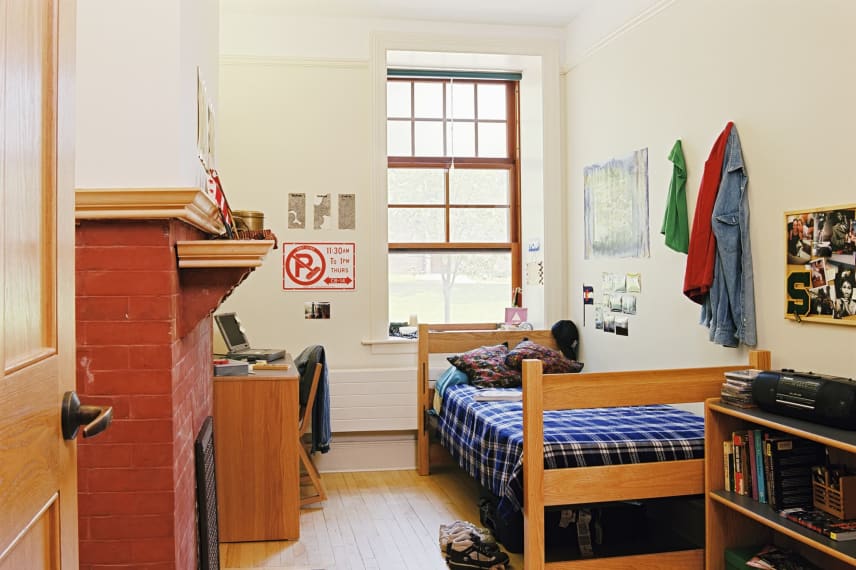
AffordableCollegesOnline.org is an advertising-supported site. Featured or trusted partner programs and all school search, finder, or match results are for schools that compensate us. This compensation does not influence our school rankings, resource guides, or other editorially-independent information published on this site.
Are you ready to find your fit?
On-campus student housing options include dorms, apartments, and learning communities. Although these options are located close to classrooms, dining halls, and other campus amenities, their prices exceed what some learners can pay. However, these degree-seekers need not live at home to reduce out-of-pocket expenses. Alternative, affordable student housing options may exist, depending on the school and surrounding area.
The following sections highlight off-campus housing opportunities for learners on a budget. Topics include ways to save money, benefits of living off campus, and tips for finding the right living situation. This guide also details additional resources for prospective renters.
AffordableCollegesOnline.org is an advertising-supported site. Featured or trusted partner programs and all school search, finder, or match results are for schools that compensate us. This compensation does not influence our school rankings, resource guides, or other editorially-independent information published on this site.
Accredited Online College Programs
Explore our featured online programs and find the right match for you today.
Off-Campus Options for Students
Learners who choose off-campus housing options can live alone or with roommates. Some students perform services for their landlord in exchange for discounted rent. Some colleges reserve housing for degree-seekers who demonstrate financial need. Learners can consult an admissions advisor for information about their school's options.
- Renting Your Own Apartment
- Although more expensive than other options, renting an apartment allows individuals to live alone and explore various housing opportunities. Students renting an apartment by themselves must typically put down a security deposit and submit to a credit check. Some landlords also require a criminal background check.
- Renting With Roommates
- Renting with roommates lowers student housing costs significantly. Students with roommates often rent apartments and houses they could not afford by themselves. However, learners with roommates have less privacy and may need to deal with situations such as one roommate not paying rent on time.
- Trade Work for Rent
- To obtain affordable student housing, learners sometimes trade work for a rent reduction. This work may involve looking after pets, maintaining a lawn or garden, and performing maintenance for other tenants. Learners with heavy course schedules may experience difficulty maintaining their grades and performing work for their landlord.
- Off-Campus University Housing
- Some colleges and universities maintain off-campus housing. These options typically feature lower rent costs than comparable apartments, along with close proximity to campus. However, schools may require tenants to abide by a curfew and not invite overnight guests. Some colleges and universities limit this housing option to graduate students and learners with a spouse or children.
Renting Off Campus
Renting off-campus housing features advantages including privacy and independence. Many apartment complexes attract tenants by offering amenities such as a gym, pool, and clubhouse. Other conveniences may include in-unit laundry, security guards, and the latest appliances. Learners researching off-campus student housing should consider their needs before touring apartments or homes.
Renters typically sign a lease describing the rent, the renters' and landlord's responsibilities, and relevant state laws. Learners searching for affordable student housing usually focus on properties offering a 12-month lease, which tend to have more affordable rates than those with shorter leases. Choosing a 12-month lease also helps students improve their credit and develop a positive relationship with their landlord.
In addition to amenities and rent payments, students should consider location when choosing an apartment or home. Choosing housing far from campus may cost less but result in stressors that can affect grades and personal relationships.
When researching student housing, individuals should create a budget that includes food, transportation, and other typical expenses. This budget helps learners understand how much they can pay for an apartment. Students may need to adjust their monthly costs to make housing affordable, especially if they choose a property offering amenities.
When signing a lease, renters provide a security deposit, which protects landlords from accidental or intentional damage to the apartment. Although security deposit amounts vary, individuals should expect to put down the equivalent of 1-2 months of rent. Learners should start saving for this expense as soon as possible.
Renters may also need to pay for utilities, such as internet, water, and electricity. Rates vary by state and city, and an apartment's size also affects the cost of utilities. These monthly bills often make off-campus student housing more expensive than on-campus dorms.
Students can protect themselves by buying renters' insurance. A renters' insurance policy covers damages to property resulting from events such as fires, floods, and thefts. Policies maintain different coverage limits and may not cover all circumstances. An insurance broker helps degree-seekers buy the right policy at an affordable price.
Tips for Finding the Right Living Situation
Degree-seekers searching for student housing should create a budget, decide whether to live with roommates, and research affordable housing options. Completing these steps promotes a positive renting experience. Students can contact a rental agent to learn more about success tips and strategies for first-time renters.
- Figure Out Your Finances
In addition to setting aside funds for rent and utilities each month, students living off campus should budget for furniture, appliances, and other personal amenities. Thrift stores may sell these items much cheaper than department stores or online retailers.
Degree-seekers may need to work to pay for student housing. Learners can research flexible, part-time job opportunities. Employers near campus may allow student employees to work extra shifts, if necessary.
- Consider Your Roommates
To afford off-campus housing, students living in expensive cities may need roommates. Degree-seekers selecting roommates can create a list of positive and negative attributes to help them choose a compatible person.
New roommates should talk about expectations. An informal contract known as a roommate agreement breaks down responsibilities, such as providing rent money by a specific date each month and completing chores.
- Ask Around
Individuals searching for affordable student housing can ask other learners about available apartments and rental homes. Peers may know about openings long before the rental is advertised.
Degree-seekers can use websites such as Zillow and Craigslist to find the latest apartment and home rentals. The latter carries some risk due to scammers. However, prospective renters can avoid scams by giving out personal and financial information only after meeting a potential landlord and taking a property tour.
- Pay Attention to Additional Costs
Applying for a rental property often involves additional costs, such as a background check fee. Students who plan to apply for multiple rentals may want to budget for this expense. Other unexpected fees may appear in the leasing agreement. Learners should ask about potential expenses during the property tour.
When signing a lease, renters should ensure that the agreement aligns with previous conversations with the landlord.
Resources for Finding Rental Housing
ULoop
ULoop allows visitors to explore hundreds of potential roommates. Users can also access the latest information on student loans, tutor profiles, and study abroad opportunities.
National Shared Housing Resource Center
NSHRC connects users to home-sharing programs throughout the United States. Learners researching student housing can access a program directory and links to state-specific organizations.
Homeshare International USA
This organization oversees more than 40 home-sharing programs. These programs are ideal for college students, senior citizens on a fixed income, and individuals with a mental or physical disability.
The Cohousing Association of the United States
This nonprofit partners with communities to promote cohousing. CohoUS offers comprehensive advice on finding the right community, along with informational videos and a blog.
Apartment Guide
This resource provides state-specific guides that walk first-time renters through the process. The website also features articles that answer college students' frequently asked questions and resources to begin apartment hunting.
Rent.com
Rent.com features thousands of apartment and home listings. The website features articles covering apartment hunting success tips and questions that renters should ask landlords before signing a lease.
Zillow.com
Zillow.com lists properties for sale and rent. Users can search by city or neighborhood for the latest rentals. Apartment listings include information regarding the security deposit, amenities, and restrictions.
Thomas Broderick
Thomas Broderick is a freelance writer and the owner of Broderick Writer LLC. He creates study guides, informational websites, and blog posts for clients in the education field. Thomas is also a published author of over 20 short stories and a member of the Science Fiction & Fantasy Writers of America.
Keep up with the latest
Never miss a detail on the news, trends, and policies that could directly impact your educational path.
Best Master's in Data Analytics Programs: What You Need to Know
Top Online MBAs in Business Analytics
Explore the top online MBAs in business analytics, including tuition costs, curricular offerings, and more with this student research resource.
Scholarships and Financial Aid in Texas
Financial aid makes college a reality for many students. Learn about the top scholarships in Texas and how you can earn one.
AffordableCollegesOnline.org is an advertising-supported site. Featured or trusted partner programs and all school search, finder, or match results are for schools that compensate us. This compensation does not influence our school rankings, resource guides, or other editorially-independent information published on this site.
Do this for you
Explore your possibilities- find schools with programs you’re interested in and clear a path for your future.
